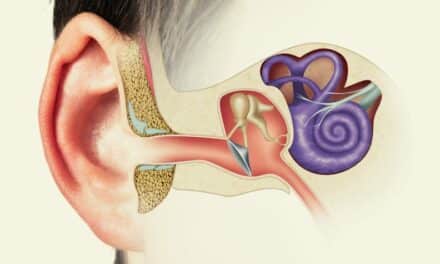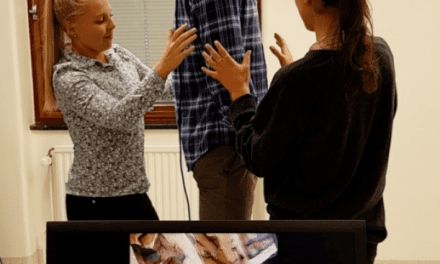Louisville-based nonprofit Heuser Hearing Institute (HHI) announced that HHI Clinical Director Dr Ingrid Edwards has coauthored and published a study along with lead author Dr Arun K. Gadre, MD, FACS and two others in the August 2020 issue of Frontiers in Neurology. The study, “Membranous or Hypermobile Stapes Footplate: A New Anatomic Site Resulting in Third Window Syndrome,” finds that those with traumatic head injuries and persistent dizziness were either misdiagnosed or grouped with concussion or chronic traumatic encephalopathy. Working collaboratively Edwards and Gadre (former Heuser Hearing Institute Professor at University of Louisville), Dr Vicky Baker (Geisinger Medical Center) and Casey Rutledge-Roof (Audiologist at University of Louisville) used innovative assessment and surgical techniques to alleviate the debilitating symptoms in order to help patients live fuller lives.
This research was conducted by a partnership between Heuser Hearing Institute, University of Louisville, and Geisinger Medical Center. The study involved researchers from each entity working in close collaboration.
The objectives of this study were to describe a potentially underappreciated pathology for post-traumatic persistent intractable dizziness and third window syndrome as well as the methods to diagnose and surgically manage this disorder.
The results in 28 patients (33 ears) over the span of an eleven year period between January 2009 and December 2019 were tabulated. The follow-up with balance testing and audiograms were performed 6–8 weeks following surgery. Follow-up ranged from 6 months to 7 years. Prior to surgery, all patients reported dizziness in response to loud sounds and/or barometric pressure changes.
Seven out of 33 ears had demonstrable leakage of inner ear fluid into the middle ear; the rest (26 ears) appeared to have membranous or hypermobile stapes footplates which is a part of the smallest bone of hearing that connects the middle with the inner ear. This is a new discovery. Twenty-four of the 28 patients (85.7%) showed resolution of their symptoms of persistent dizziness and none of the patients demonstrated a loss of hearing following surgery.
“Frontiers in Neurology is a recognized and well-respected journal in the field, so we’re honored to have our work published there,” said Edwards. “I am excited about our collaboration and the potential for future patient care. From both a clinical and surgical standpoint, we used existing tools and knowledge, combined in a different way, to find a solution. Most, if not all, of the patients we were able to help had been told that they had nothing physically wrong with them in the past.
“I would like to see continued research in this particular area as most of our patients had traumatic head injuries that were either misdiagnosed as having concussion or chronic traumatic encephalopathy (CTE). The result was that many sought out their own healthcare after being told to ‘live with it’ or ‘it would go away eventually.’”
“It has been wonderful collaborating with my colleagues in audiology on this crucial research and I am very pleased that we were able to identify a new finding during surgery which has not been previously observed,” said Gadre. “I am most excited that surgical intervention has given hope to patients who have suffered terribly for years before we were able to help them. Dr Ingrid Edwards approached me with her observations and I was able to deduce the pathology utilizing the invert function on CT scan (like a photographic positive). We are now able to diagnose the condition with reasonable certainty prior to surgery.”
If you or your loved ones are experiencing hearing loss, dizziness, or other ear-related disorders, please reach out to Heuser Hearing Institute at 502.584.3573. Additionally there are several outlets which can help support and educate located at the Heuser Hearing Institute webpage: www.thehearinginstitute.org.
Original Paper: Gadre AK, Edwards IR, Baker VM, Roof CR. Membranous or hypermobile stapes footplate: A new anatomic site resulting in third window syndrome. Frontiers in Neurology. 2020(11). DOI: https://doi.org/10.3389/fneur.2020.00871.
Source: HHI, Frontiers in Neurology





